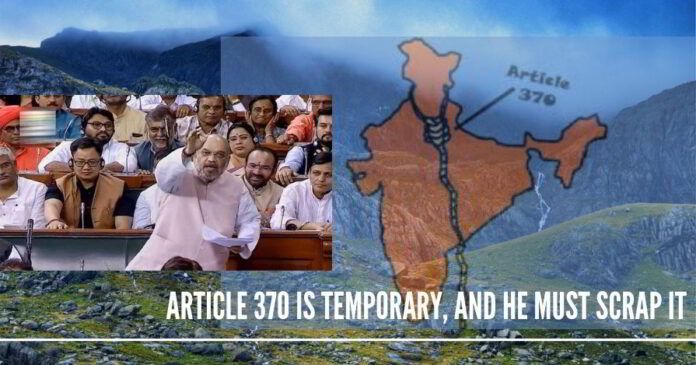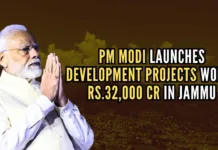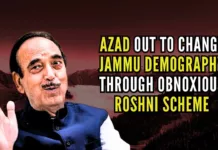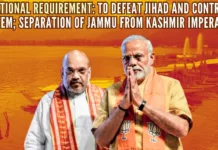
Article 370 is not permanent and there is no change in our stand on it. It is there in the Constitution of India but remembers it is a temporary and not permanent provision
On June 28, the nation witnessed a great debate in the Lok Sabha on Jammu & Kashmir. The debate was on who did what to hurt the nation in the state, drive it away from the national mainstream, subvert democratic processes to fulfill the insatiable urge of Sheikh Abdullah, Bakshi Ghulam Mohammad and ilk for power and pelf, help Pakistan annex 1/3rd of the Jammu & Kashmir territories and deny the people of Jammu and Ladakh their legitimate due share in the state’s socio-economic and democratic processes. Amit Shah only spoke the truth when he held JL Nehru responsible for the whole mess in the state. He only spoke the truth when he said that Nehru allowed Pakistan to annex 1/3rd of J&K territories, now called PoJK and Gilgit-Baltistan. He only spoke the truth when he said: had Sardar Patel handled J&K like he handled other 560-odd princely states, including Hyderabad and Junagarh, there would not have been any Kashmir problem.
The debate will be remembered for years to come as it clinched many issues and exposed the Congress and the National Conference and as Union Home Minister Amit Shah put the nature of the obnoxious Article 370 in perspective.
The truth is that the nation has taken the Amit Shah’s statement to mean that the days of Article 370 (the mother of all ills) are only numbered. And, why not? After all, the 2019 mandate was against Article 370 and Article 35A
June 28 will be remembered for decades for two other reasons. One, it will be remembered because Amit Shah’s first-ever statutory resolution and reservation bill as Home Minister in the Lok Sabha was on Jammu & Kashmir and for his great, bold and meaningful speech on the issues afflicting the sensitive border state. Both were adopted by voice vote on the same day. The statutory resolution sought an extension of President’s Rule in Jammu & Kashmir for six months and the other bill sought 3 per cent reservation for people living along the international border (predominantly Hindu). The people of Samba, Kathua and Jammu districts will be benefited. Hitherto, people (almost 100 per cent Muslims) living along the Line of Control (LoC) used to enjoy the 3 per cent reservation in jobs and educational and technical and professional institutions.
Two, June 28 will also be remembered for the senseless opposition of the Congress and the National Conference to the 3 per cent reservation bill and the bill seeking an extension of the President’s rule. Both the Congress and the National Conference wanted the reservation issue to be left to the care of the Jammu & Kashmir Assembly, a canny suggestion. Canny suggestion because they knew that the Kashmir-controlled, Valley-centric and Muslim-dominated Assembly will never allow any legislation that caters to the needs of the people belonging to other faiths. And both the Congress and the National Conference registered their opposition to the bill seeking an extension of the President’s Rule saying the Narendra Modi Government misused Article 356 with a view to ruling the state through its Governor.
It’s a different story that the Congress had invoked Article 356 as many as 93 times out of 132 occasions to dismiss the democratically-elected governments in the various states and the VP Singh and the Narasimha Rao Governments kept Jammu & Kashmir under the Governor’s Rule and President’s Rule from January 19, 1990 and October 9, 1996. Chief Minister Farooq Abdullah had dissolved the Assembly on January 19, 1990, and fled away to London. The Congress and the National Conference, like all other parties, including the BJP, consistently opposed the idea of holding assembly elections in Jammu & Kashmir between 1990 and 1996, saying the situation in the Valley was volatile and there was no possibility of free and fair polls in the state. The assembly elections were held in September-October 1996 and Farooq Abdullah again took over as Chief Minister for the third time.
Let’s focus on what transpired in the Lok Sabha as far as Article 370 was concerned. It was perhaps for the first time after 1950 that any Home Minister of India took a clear stand on Article 370 of the Indian Constitution under which the solitary State of Jammu & Kashmir enjoys a separate status, has the separate constitution and separate flag and exercises residuary powers.
What transpired in the Lok Sabha as far as Article 370 was concerned? Acknowledging the contention of National Conference MP Justice (Retd) Hasnain Masoodi about Article 370 being part of the Constitution, Amit Shah reminded him, not once but twice, that it was temporary.
“Article 370 is not permanent and there is no change in our stand on it. It is there in the Constitution of India but remembers it is a temporary and not permanent provision,” Amit Shah said while tearing into the National Conference MP from Anantnag.
It bears recalling that Justice Masoodi, in his capacity as Judge of Jammu & Kashmir High Court, along with Justice Janak Raj Kotwal had, on October 11, 2015, ruled in their 60-page judgment that Article 370 had assumed place of permanence in the Constitution and that the Article 370 was beyond amendment, repeal or abrogation. It had ruled: “Article 370 though titled as ‘Temporary Provision’ and included in Para XXI titled ‘Temporary, Transitional and Special Provisions’ has assumed a place of permanence in the Constitution…It is beyond amendment, repeal or abrogation, in as much as Constituent Assembly of the State before its dissolution did not recommend its Amendment or repeal”. They had virtually given every one to understand that Jammu & Kashmir was a sovereign state and Indian Parliament had no right whatsoever to legislate for and on behalf of Jammu & Kashmir State. The two High Court Judges had held that Jammu & Kashmir had “absolute sovereign powers to legislate laws touching the rights of its permanent residents regarding their immovable properties”.
It would not be out of place to mention here that the Supreme Court of India had on January 16, 2018, set the record straight and ruled that Jammu & Kashmir had no vestige of sovereignty outside the Indian Constitution.
“Jammu & Kashmir has no ‘vestige’ of sovereignty outside the Indian Constitution and its own, while the citizens of the state are ‘first and foremost’ citizens of India. The State of Jammu & Kashmir is subordinate to the Constitution of India. It is wholly incorrect to describe Jammu & Kashmir as being sovereign in the sense of its residents constituting a separate and distinct class in themselves. The residents of Jammu & Kashmir, we need to remind the Jammu & Kashmir High Court, are first and foremost citizens of India,” Supreme Court bench comprising Justices Kurian Joseph and RF Nariman had ruled.
The Home Minister Amit Shah’s statement on Article 370 has been appreciated by one and all, barring those who masquerade as “secularists”. And, it is only natural. The truth is that the nation has taken the Amit Shah’s statement to mean that the days of Article 370 (the mother of all ills) are only numbered. And, why not? After all, the 2019 mandate was against Article 370 and Article 35A, for national unity and for one nation, one law. Let Amit Shah walk the talk. Mere stating the truth is not enough. He must walk the talk because Article 370 empowers the people of Kashmir to exercise all rights all over India but bars the people of the rest of the country from exercising any right in J&K, as also because it was passed as Article 306 (A) much against the wishes of the Chairman of the Indian Constituent Assembly and Law Minister BR Ambedkar.
Note:
1. The views expressed here are those of the author and do not necessarily represent or reflect the views of PGurus.
- ‘Kashmir My core constituency’: Revisiting July 12, 2003 to understand politics, Omar Abdullah-style - March 15, 2024
- Total deviation from traditional approach: Seven takeaways from PM Modi’s March 7 Srinagar visit - March 9, 2024
- Status of political parties: Why is further J&K reorganization imperative? - March 1, 2024











Why BJP Leaders are beating around the bush I do not understand. Art 35A a surreptitious insertion in the Constitution. Art 370 is clearly a TEMPORARY provision, which has no UTILITY whatsoever, either to J&K State and / or Indian Constitution. It was craftily designed and stealthily inserted and cunningly used / applied to continued loot of resources of Govt by Muslim Sultanate and subjugation of Hindus, Sikhs, Jains etc perpetually, as a second class citizens in their very own Country. Dr Subramanian Swamy, Rajya Sabha MP has clearly and consistently suggested REPEAL of both Art 35A & 370 would require by a Union Cabinet Resolution approved by President of India. Is it the stand of BJP led NDA Govt, that just because the suggestion of Abrogation of Art 35A / Art370 through Cabinet Resolution came from Dr Swamy, they are UNWILLING to do that, because the Credit for complete integration of J&K with rest of Indian Union would accrue to him? Mr Narendra Modi / Mr Amit Shah, MUST keep in their mind, that they came to power and assumed power as PM / HM respectively, to UPHOLD THE SOVERIGNITY & TO PROTECT TERRITORIAL INTEGRITY of our Country. BJP has already wasted FIVE years by now withdrawing the above anti-national obnoxious provisions during 2014-2019 and their continued dithering now in 2019 is amounting to repeated BETRAYAL OF TRUST of majority communities & BETRAYAL OF MANDATES of 2014 & 2019. JS / BJP’s conscious and continued stand since 1950 is REPEAL of Art 35A & Art 370 and it is their in every election manifestos of BJP. Any further delay in the IMMEDIATE REPEAL of above surreptitious & obnoxious provisions will only worsen the internal situation in J&K State, with attendant impact on the rest of the Country. I PRAY TO LORD KEDARNATHji / AMARNATHji / BADRI VISHAALji TO GRANT COURAGE, STRENGTH & GOOD SENSE TO OUR RULERS TO TAKE RIGHT DECISIONS QUICKLY IN THE INTEREST OF OUR NATION.